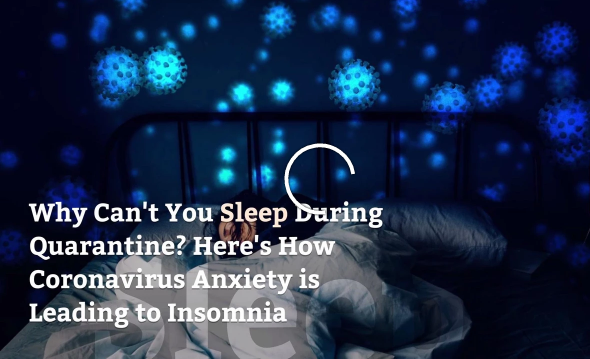Other problems - such as fragmented sleep and nightmares - are still common.
 |
| Coronavirus disease |
At its best, sleep comes with a long list of health benefits: it reduces the risk of inflammation, stress, and depression; Improves cognitive function; And helps the body repair and ward off disease. Right now, between COVID-19, a good night's sleep has never been more important - but many are struggling to get their eight hours.
According to a recent report by Express Scripps, a prescription benefit plan provider, there has been an increase in the use of anti-insomnia, anti-anxiety and antidepressant medications, with a 21% increase in prescriptions between February and March 2020: - Use The decrease between the latter 2015 and 2019. Those numbers were at peak during the week of March 15 - the same week the World Health Organization declared COVID-19 an epidemic, and the US declared a national emergency in response to the crisis.
"COVID-19 status is unprecedented in our lifetimes. It affects everyone, all the time," said Alcibades Rodriguez, MD, medical director of NYU Langone Health's Comprehensive Epilepsy Center-Sleep Center. Totally deals with this, and is usually focusing mostly on the negative. Anxiety levels are high, which can lead to fragmented sleep, abnormal sleep schedules, etc.
The effects of coronaviruses on people's sleeping habits are also fascinating researchers. At the Turner Institute for Brain and Mental Health at Monash University, Australia, Drs. Melinda Jackson and her team are running a study specifically about the symptoms of insomnia during an epidemic. "The effects of this epidemic have enormous economic, health, and social impacts - all of which can affect our way of sleeping," said Dr., a senior lecturer in psychology. Jackson tells health. "We are interested in determining the social effects of COVID-19 and self-isolation on sleep, as well as stress levels and mood."
Preliminary results suggest that there is something wrong going on there. Dr. Jackson says, "Some people are reporting more or less sleep than normal, while there are others who are missing the fact that they don't have to get up at a certain time each day and they're sleeping more Huh."
For those whose sleep habits are suffering, Drs. Jackson believes that concern about our health and our loved ones, as well as financial distress and job loss, may increase. "Being isolated at home can also affect our normal routine," she says. "For example, it is really important to be consistent with your waking time, but it goes out the window when we don't have to get up every morning for the morning."
The relationship between stress and sleep issues is complex, but studies have shown that stress affects various neurotransmitters affecting the brain. Brandon Peters-Matthews, MD of Sleep Medicine, Virginia Mason Medical Center, Seattle, and Brandon Peters-Matthews, MD, author of Sleep Insomnia, said "increased cortisol may be of particular importance as part of the stress response . " "These chemicals can shift the sleep-wake balance in the brain, leading to increased sleep fragmentation and increased insomnia (sleeping habits or sleepiness) and nightmares." Here you are experiencing any (or all) of those sleep-related conditions right now - and what you can do to improve your sleep ASAP.
Insomnia
Dr. Rodriguez says insomnia often runs in families, but is also associated with mental health disorders such as anxiety. He says that "epidemics may be the cause of insomnia in patients who are already afflicted, or may trigger new insomnia in others," as well as anxiety related to coronovirus, sudden changes in daily activities, and social isolation. May contribute to changes in sleep. Pattern. "
If you are spending more time on your screen than ever before - watching news updates, reading COVID-19 advice, and staying connected with family and friends - it can also make it harder to sleep because the screen is blue The light tells the brain to stop producing the sleep hormone melatonin, he says.
Insomnia can also be depression-based. Constant low mood, more downtime at home, and lack of energy can increase daytime naps, which can eventually make it harder to sleep at night.
Fragmented sleep
If you can sleep without too much trouble while sleeping, but experience many brief sensations throughout the night, this is known as lack of sleep. It is often caused by major stresses such as the coronovirus epidemic.
Dr. "The brain processes information during sleep," says Peters-Matthews. “Many of our routines have been badly disrupted by Kovid-19. As we spend more time at home, we can increase family or relationship stress. Our common outlets for reducing stress - exercise, spending time with friends, going out to eat, watching a movie or being absent in nature. As the brain processes this extra stress, we may have more night awakenings.
Disturbing dreams
Sleep defects (most people call nightmares) are often associated with nocturnal awakening. Dreaming is a symptom of rapid eye movements (REM) sleep, as well as a rapid pulse rate and breathing, which occur at intervals during the night. Dr. "Waking up from REM sleep will miss these troubled dreams," says Peters-Matthews. "Nightmares can also increase due to stress." So really, it might not actually be the case that you have more disturbing dreams - just that you are missing the contents of the dream more because you are waking up more often through the night.
However, there is still a connection between anxiety and disturbing dreams. Dr. "We have extreme dreams in patients with post-traumatic stress disorder (PTSD)," says Rodriguez. While most people do not experience PTSD as a result of the epidemic, it cannot be dismissed especially for frontline activists and those who have lost loved ones to the disease.
If it makes you feel better, some studies suggest that anxious dreams are not all bad. A 2010 study published in Current Biology found that those who had dreamed about solving the maze were working 10 times better than those who had not dreamed about it. And a 2014 study of students studying for the Sorbonne exam, published in Conson Cognition, found that those who had a night of anxiety did better on the night before the exam.
How to improve your sleep:
Dr. According to Peters-Matthews, the most important thing at this time is to regularly schedule sleep. "Try to get 15 to 30 minutes of sunlight exposure every day at the same time and wake up," he says, "go to bed to feel sleepy, but more than seven to nine hours in bed Don’t spend. ”While everyone’s sleep needs vary, Drs. Peters-Matthews states that most adults need about eight hours. (Those sleep needs begin to change at the age of 18, though teenagers between the ages of 13 and 18 need up to 10 hours a night, while children from 4 months to 12 months need American Academy. According to off paediatrics, one should sleep for 16 hours a day.
You should also be aware of how your daily activities can damage or benefit your sleep schedule. Dr. "Try to avoid your intake of caffeine and alcohol, especially in the evening," says Peters-Matthews. On the other hand, Drs. Malo emphasizes the importance of regular daily exercise, and says that walking can also be helpful to promote sleep. "Try to carry every hour and engage in regular exercise - if you can, outside". And of course, it is important to limit your news intake right now, if it causes concern. "Turn off the screen at bedtime, especially close to social media and the news cycle," she says.
If you feel like you can't work, go to the gym, or spend time with your friends, then try to spend that free time in self-care. "Peters-Matthews says," try to cultivate ways to reduce stress and reach out to others for support. "If insomnia persists, consider cognitive behavioral therapy for insomnia (CBTI), a technique for treating insomnia without drugs."
But remember: Any coronovirus-related anxiety you're feeling won't always be there. "There's light at the end of the tunnel," Dr. Jackson says. "We just have to make a positive effort every day and focus on what we can do here and now."
The information in this story is accurate as of press time. However, as the situation around COVID-19 continues to evolve, it is possible that some data may have changed since publication. While Health is trying to keep our stories as up to date as possible, we encourage readers to stay informed on news and recommendations for their own communities using the CDC, WHO and their local public health department as resources .






No comments:
Post a Comment